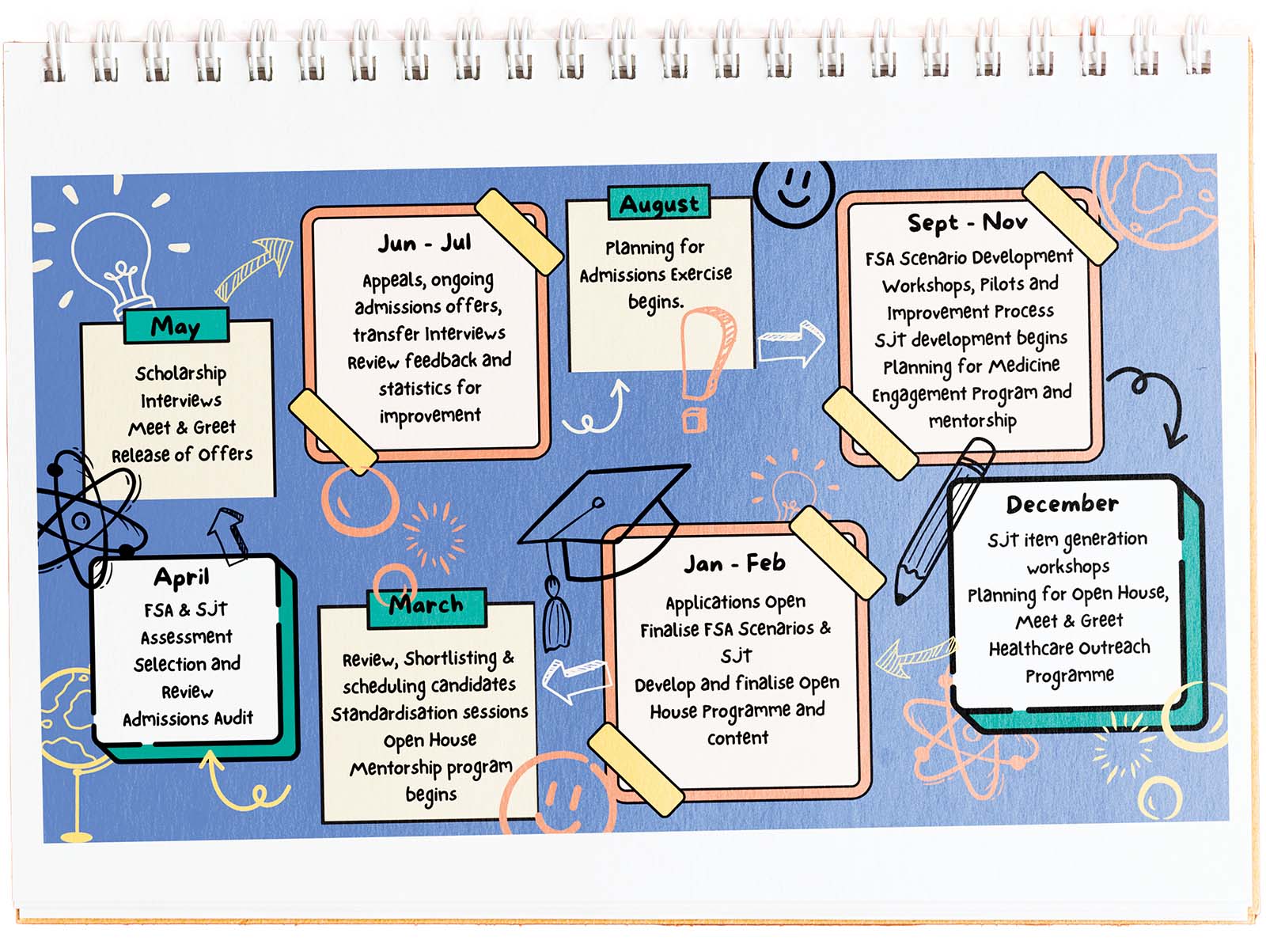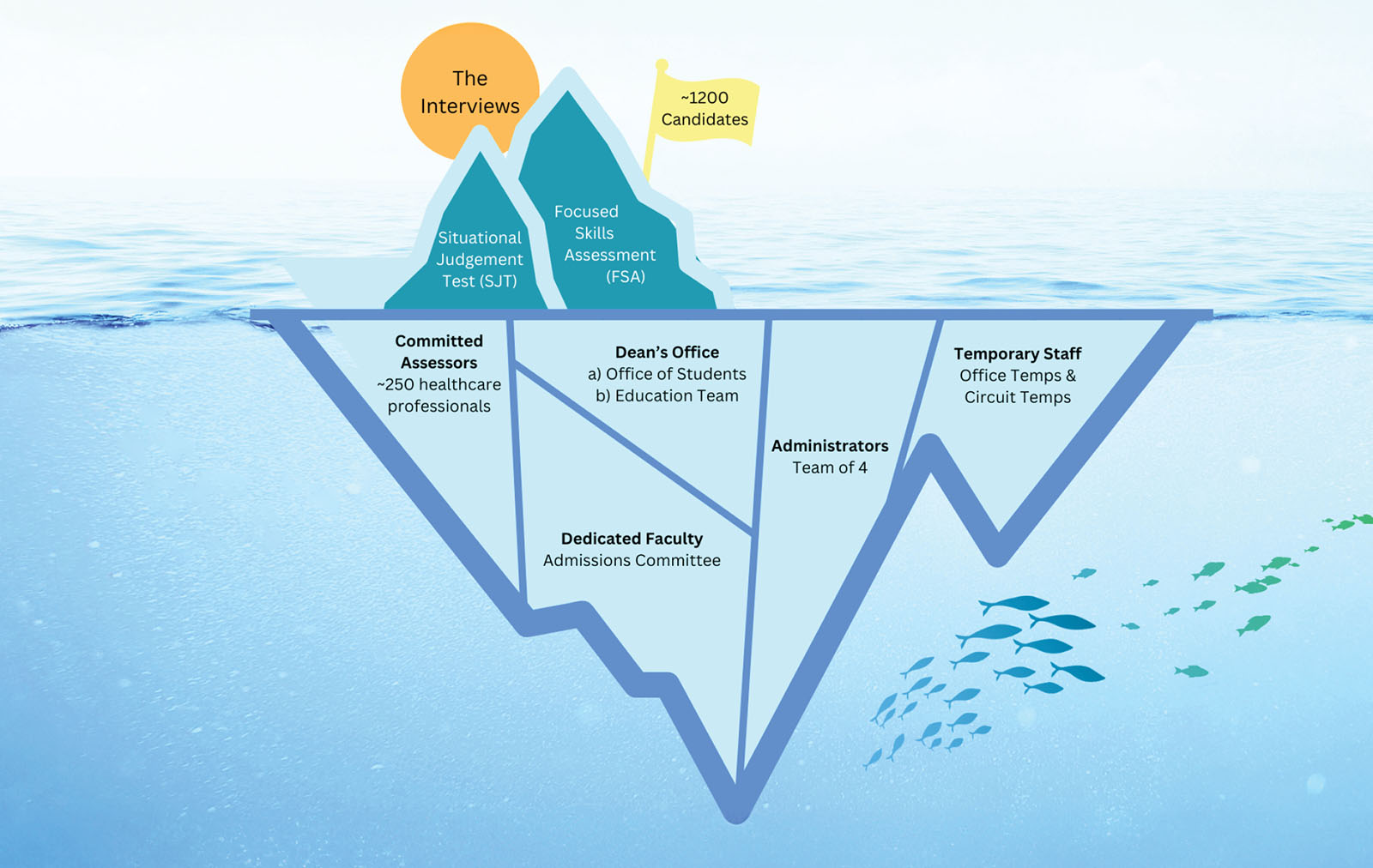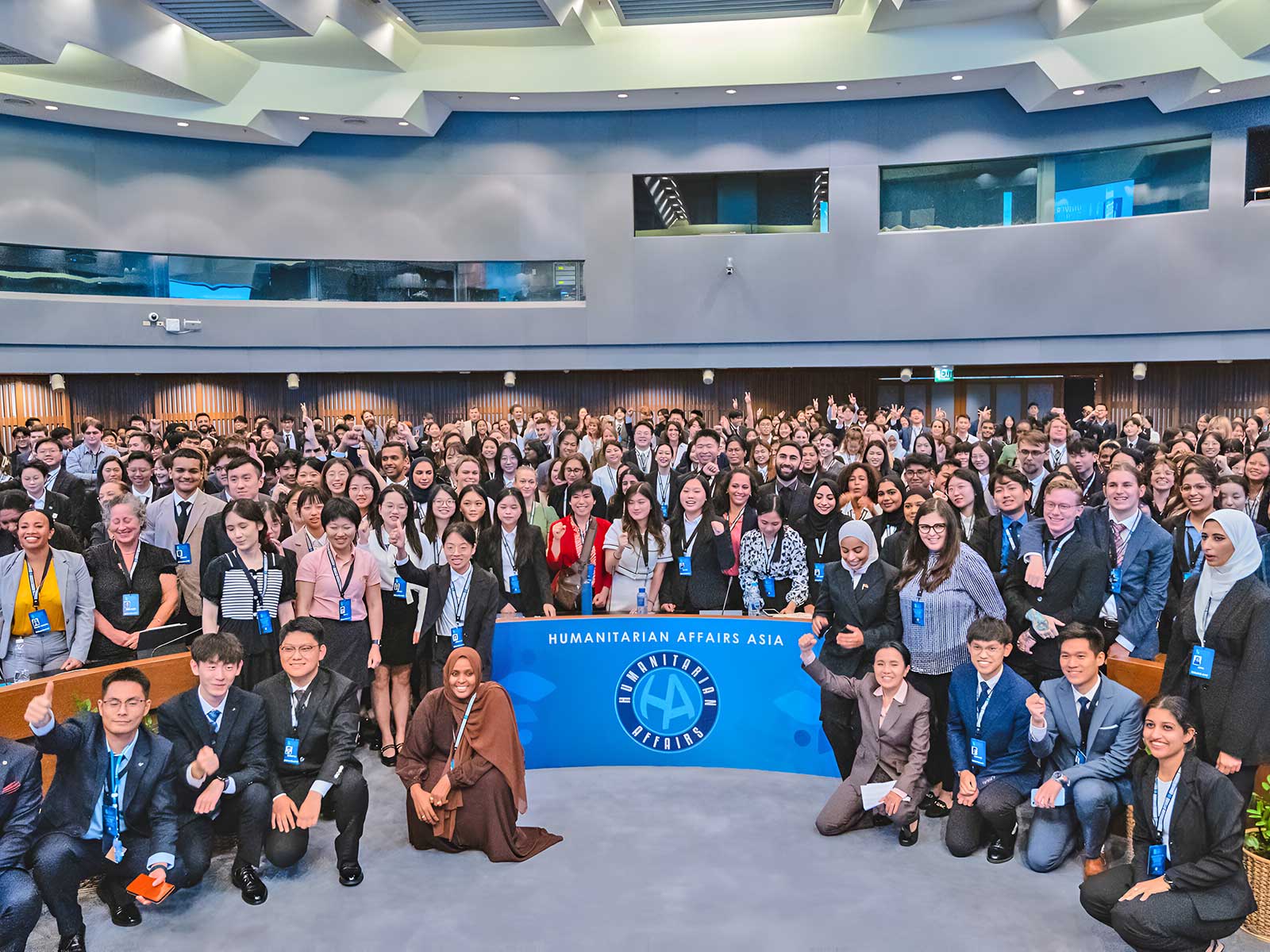
Issue 49
Feb 2024
STUDENT MATTERS

Each year, the Yong Loo Lin School of Medicine receives applications from aspiring candidates seeking places in its five-year MBBS undergraduate degree programme.
The young men and women who meet the initial qualifying academic requirements are invited to interviews, where they are put through their paces via a series of assessments, including a written exercise. These are designed to probe and ascertain candidates’ attitudes and aptitude—while intellectual capabilities are fundamental requirements, qualities such as respect, integrity, compassion, humility, and a commitment to society’s welfare are also vital and essential for a career in Medicine.
The search for tomorrow’s doctors
At the core of NUS Medicine’s admissions process is a group of dedicated faculty and administrators who are entrusted with organising the selection of students with the values that align with those of the Yong Loo Lin School of Medicine, and which provide the foundation for a career of service in healthcare.
“We look beyond grades to discover those qualities that make outstanding healthcare professionals. While academic prowess is important, personal qualities and values are what the admissions process tries to identify in our candidates,” said Associate Professor Marion Aw, the School’s Vice-Dean for Students. She leads the NUS Medicine Admissions Team in laying the groundwork for the School’s annual selection exercise, an annual event that is months in the preparation.
While candidates who qualify for admissions approach the NUS Medicine selection process with a mix of eager anticipation, excitement and anxiety, the School takes pains to ensure an inclusive environment that is beneficial for students’ development. There are accessibility options for students with different learning needs such as dyslexia, colour deficiency, physical disability and others. Applicants are encouraged to declare their learning needs so that support can be rendered early to cope with the rigours of medical school, A/Prof Aw said.
In addition to ‘A’ Levels holders, the School also welcomes applications from polytechnic graduates and runs the NUS Medicine Engagement Programme to introduce students from polytechnics and junior colleges to a career in Medicine. Schools are also invited to nominate students who they think are suitable, but who may not have considered Medicine as a possible career.
The programme consists of a non-residential camp and a three- to four-month long mentorship component, and which assigns students to practising clinicians. The students shadow these clinicians and learn about life as a doctor. Financial support is provided by NUS Medicine for participants on financial aid.
Making the list: The interview process
The interview stage of the NUS Medicine admission exercise holds profound significance. Together, the Situational Judgement Test (SJT) and Focussed Skills Assessment (FSA), provide selectors with a good understanding of the strengths, values and likely suitability of candidates for medical studies.
The FSA delves into applicants’ attitudes and aptitudes, evaluating skills essential for medical practice. This multifaceted assessment examines attributes such as critical thinking, communication, empathy and problem-solving. Complementing this, the SJT gauges ethical and situational reasoning. It presents real-world scenarios, where candidates’ choices express and demonstrate their views, values as well as decision-making ability.
The School’s admissions exercise seeks to gauge attributes beyond knowledge—qualities such as compassion, integrity and adaptability. They provide a platform for candidates to demonstrate their potential as future doctors.

Contrary to common belief that admissions activities happen only between February and May, the Admissions Team and committee work throughout the year. The Admissions Team starts planning for each upcoming admissions cycle from August of each academic year.
Planning and preparation
Organising the annual admissions assessment exercise is a continuous process that begins, ends and begins again with every intake of medical students. Spread across seven days, the admissions assessment accommodates over 1,000 candidates, who have to navigate a written assessment (SJT) and a rigorous six-station FSA. A dedicated team of approximately 250 faculty assessors contribute their time and expertise towards this intricate selection procedure.
For candidates, the day that they spend undergoing selection is for many a culmination of years of hard work, noted A/Prof Aw. “It is very important that we exercise due diligence to ensure an efficient yet robust and evidence-based admissions process,” she added.
It is very important that we exercise due diligence to ensure an efficient yet robust and evidence-based admissions process.”
As one admissions exercise ends, planning for the next one begins
Behind the scenes, NUS Medicine’s selection process is guided by the institution’s mission and the broader healthcare needs of Singapore. The decisions made extend beyond individual achievements to encompass the collective potential of each cohort, reflecting the School’s dedication to shaping the future of healthcare.

What it takes to mount the annual selection exercise for Medicine applicants.
For the aspiring doctors who have secured admission, the journey is just beginning. Orientation programmes, mentorship initiatives, and resources are designed to ensure a seamless transition into the life of a medical student at NUS. Campus life offers a plethora of student activities, balancing academic rigour with a vibrant culture. In addition, the network of the School’s 10 Houses enables new students to form strong bonds with their seniors and peers. Very often, these ties endure and last for life, as students graduate and embark on their individual careers as medical practitioners.
Meanwhile, the Admissions Team goes back to work, analysing feedback, improving the existing admissions exercise framework. Quietly but surely and with certainty, the Admissions Office team responsible for the process by which Singapore’s future doctors are identified and admitted is going about their work to help shape the future of Medicine.
Conclusion
The path to NUS Medicine is a journey of dedication, determination, and discovery. Understanding the intricacies of NUS Medicine admissions unveils a world where values align with aspirations, diversity shapes excellence, and holistic healthcare is the ultimate goal. As aspiring medical students set forth on this transformative journey, armed with insights into the heart of NUS Medicine’s admissions process, they can stride confidently towards their dreams, knowing that the path they tread is illuminated by NUS Medicine’s unwavering commitment to producing compassionate, competent, and impactful healthcare leaders. The Admissions Team at NUS Medicine would also like to thank all the faculty, staff and students who lend their time and energy to the various admissions and outreach events. With their expertise, the admissions process is able to continually improve and further NUS Medicine’s vision.
More from this issue



